
Konkani is an Indo-Aryan language spoken by the Konkani people, primarily in the Konkan region, along the western coast of India. It is one of the 22 scheduled languages mentioned in the Indian Constitution, and the official language of the Indian state of Goa. It is also spoken in Karnataka, Maharashtra, Kerala, Gujarat as well as Damaon, Diu & Silvassa.

Vishnu Vaman Shirwadkar, popularly known by his pen name, Kusumāgraj, was a Marathi poet, playwright, novelist and short story writer, who wrote of freedom, justice and emancipation of the deprived.
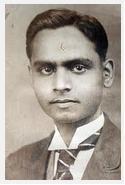
Bal Sitaram Mardhekar was a Marathi writer who brought about a radical shift of sensibility in Marathi poetry. He was born in a town called Faizpur in the Khandesh region of Maharashtra.
Gangadhar Gopal Gadgil was a Marathi writer & academic from Maharashtra, India. He was born in Mumbai in 1923. After receiving a master's degree in economics from the University of Mumbai, he worked as a professor of economics at Sydenham College and also a few other colleges in Mumbai. He was the first principal of well known Narsee Monjee College of Commerce and Economics from 1964-71. Gadgil was a prolific and multi-faceted writer, with published work in Economics, Literature, Biography, Literary Criticism and Travel Writing. The U.S. Library of Congress South Asian Literary Recordings Project has recordings of his reading from six of his books. They have also acquired sixty-five of his books for their collection.
Ganesh Narayandas Devy is an Indian cultural activist, literary critic and former professor of English. He is known for the People's Linguistic Survey of India and the Adivasi Academy created by him. He is credited with starting the Bhaashaa research and Publication Centre. He writes in three languages—Marathi, Gujarati and English. His first full-length book in English is After Amnesia (1992). He has written and edited close to ninety books in areas including Literary Criticism, Anthropology, Education, Linguistics and Philosophy.
Anant Kakba Priolkar was an Indian polemicist, author and political activist. Born in 1895, he started writing while he was in school and his writing stopped only with his death. He was also elected as the President of the Akhil Bharatiya Marathi Sahitya Sammelan held in 1951 at Karwar. His book The Goa Inquisition remains his bestselling work. He also considered Konkani as a dialect of Marathi language. He died in Maharashtra in 1973.
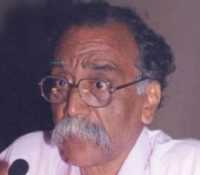
Bhalchandra Vanaji Nemade is an Indian Marathi language writer, poet, critic and linguistic scholar. Beginning with his debut novel Kosala, Nemade brought new dimensions to the world of Marathi literature. This was followed by a tetralogy consisting of novels Bidhar, Hool, Jareela and Jhool. In 2013, Nemade published his magnum opus titled Hindu: Jagnyachi Samruddha Adgal which is regarded as his masterpiece. Nemade is a recipient of the Sahitya Akademi Award as well as the Jnanapith Award, the highest literary honour in India. In 2013, he was awarded the Padma Shri.
Balakrishna Bhagwant Borkar commonly referred to as Bakibab Borkar, also known as Bā Bha Borkar, or Ba-ki-baab was an Indian poet. He started writing poems at an early age. The author Vi SA Khandekar was an early champion of Borkar's poetry. Borkar joined Goa's fight for freedom in the 1950s and moved to Pune, where he worked for the radio. Most of his literature is written in Marathi, though his Konkani output is also considerable. He excelled as a prose writer as well. His long poems Mahatmayan, an unfinished poem dedicated to Gandhi), and TamaHstotra are famous. One of his famous poems is "Mazha Gaav", meaning "My village". After Borkar's death, Pu La Deshpande and his wife Sunitabai performed public readings of Borkar's poetry.
Setumadhavarao Pagdi or Sethu Madhav Rao Pagdi was an Indian civil servant, a polyglot linguist, an accomplished historian and a distinguished man of letters specialised in modern Maratha history, especially the history of Shivaji. He also worked as the secretary of Government of Maharashtra. As a secretary he did his job fairly well. Setu Madhavrao was well versed in Marathi, English, Hindi, Sanskrit, Urdu and Persian, apart from Kannada, which was his mother tongue. As a linguist he discovered the sound system and Grammars of tribal languages like Kolami and Gondi. He was one who served the cause of Marathi against all odds in pre and post - Independent Hyderabad state. Following in the footsteps of the noted Bengali historian Jadunath Sarkar, Setu Madhavrao wrote Shivaji's biography in Marathi and English and the theory enkindled the spirit of nationalism in his readers.

Dattatreya Balkrishna Kalelkar, popularly known as Kaka Kalelkar, was an Indian independence activist, social reformer, journalist and an eminent follower of the philosophy and methods of Mahatma Gandhi.
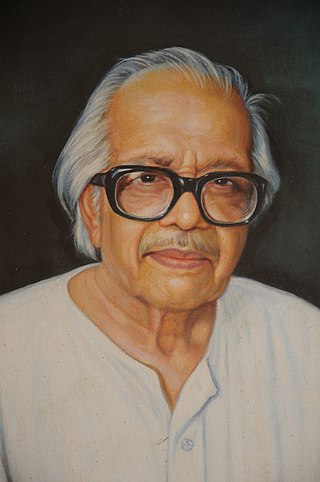
Ravindra Kelekar was a noted Indian author who wrote primarily in the Konkani language, though he also wrote in Marathi and Hindi. A Gandhian activist, freedom fighter and a pioneer in the modern Konkani movement, he was a well known Konkani scholar, linguist, and creative thinker. Kelekar was a participant in the Indian freedom movement, Goa's liberation movement, and later the campaign against the merger of the newly formed Goa with Maharashtra. He played a key role in the founding of the Konkani Bhasha Mandal, which lead the literary campaign for the recognition of Konkani as a full-fledged language, and its reinstatement as the state language of Goa. He authored nearly 100 books in the Konkani language, including Amchi Bhas Konkaneech, Shalent Konkani Kityak, Bahu-bhashik Bharatant Bhashenche Samajshastra and Himalayant, and also edited Jaag magazine for more than two decades.
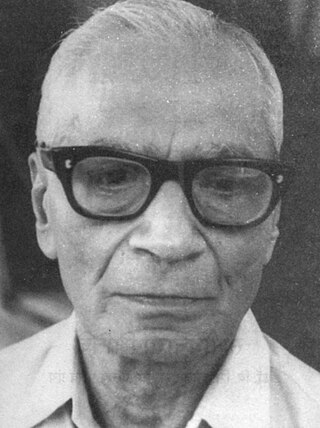
Vishnu Bhikaji Kolte (1908–1998), popularly called Bhausaheb Kolte was a Marathi writer and researcher of old Marathi literature. He hailed from Maharashtra, India. He served as Vice chancellor in Rashtrasant Tukadoji Maharaj Nagpur University.
Madhav Julian was the pen name which Madhav Tryambak Patwardhan used in writing Marathi poetry.
Shrikrushna Keshav Kshirsagar (1901–1980) was a Marathi writer from Maharashtra, India.
Ashok Ramchandra Kelkar (1929–2014) was a linguist and critical Marathi writer from Maharashtra, India. He was honoured with the Padma Shri in 2002 and Sahitya Akademi Award for Marathi in 2010.

Uday Laxmikant Bhembre is an Indian lawyer, Konkani writer and former member of the Goa, Daman and Diu Legislative Assembly. He is noted for his role as the editor of the Konkani daily, Sunaparant, and as a Konkani language activist. Bhembre is also widely known as the lyricist of the famed Goan Konkani language song Channeache Rati.
Manohar Rai Sardesai was an Indian Konkani poet, writer and French translator. He received his Doctorat ès lettres françaises for his thesis "L'image de l'Inde en France" from the University of Sorbonne. He has been credited for an upsurge of modern Konkani poetry. Sardesai died in 2006.
Dr. Akshaykumar Malharrao Kale born 27 July 1953, is a critic of modern Marathi poetry, and was Professor and Head of Marathi Department in RTM Nagpur University, Nagpur, India. In the field of criticism of modern Marathi poetry, his contributions have attracted the attention of scholars of Marathi language and literature throughout Maharashtra. He was the president of prestigious 90th Akhil Bharatiya Marathi Sahitya Sammelan held in Dombivali. Kale is also member of general Council of Sahitya Akademi, India.
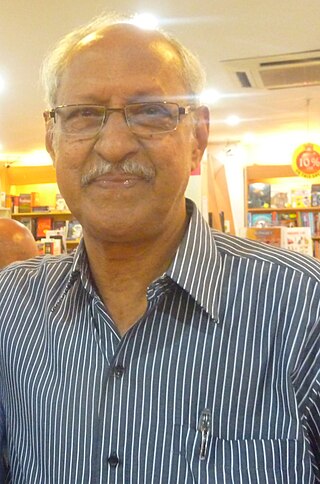
Damodar Mauzo is an Indian short story writer, novelist, critic, and screenwriter in Konkani. He was awarded the 57th Jnanpith Award, India's highest literary honour, in 2022, Sahitya Akademi Award in 1983 for his novel Karmelin and the Vimala V. Pai Vishwa Konkani Sahitya Puraskar award for his novel Tsunami Simon in 2011. His collection of short stories Teresa's Man and Other Stories from Goa was nominated for the Frank O'Connor International award in 2015. He has served as a member of the executive board, general council, as well as the finance committee of the Sahitya Akademi.








